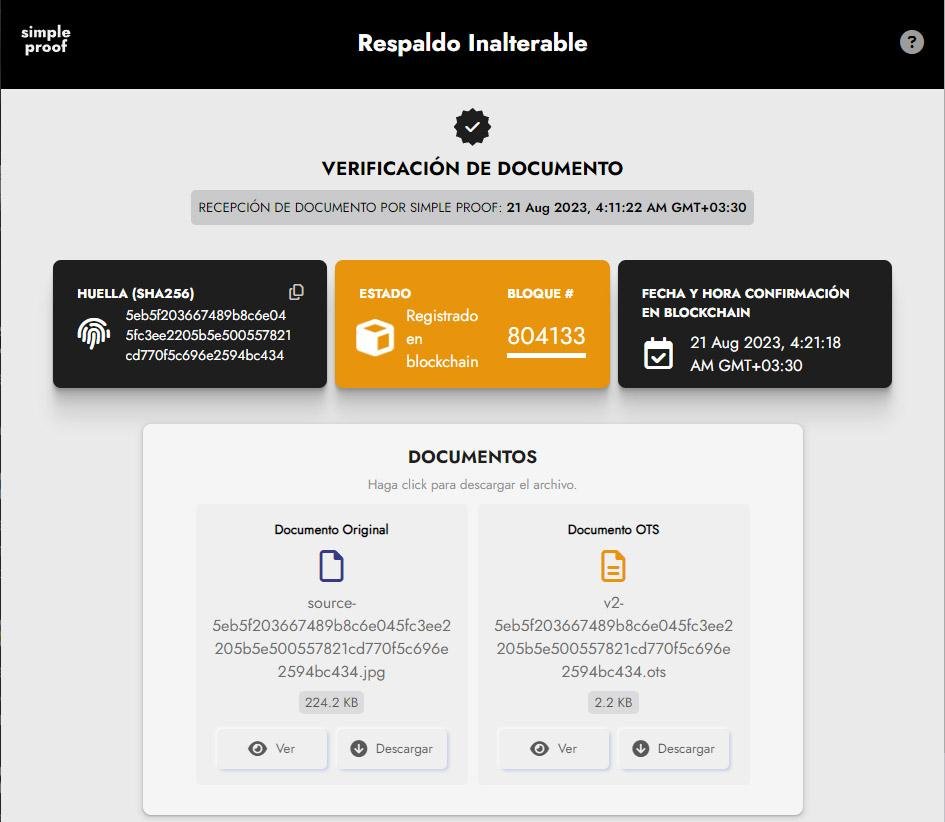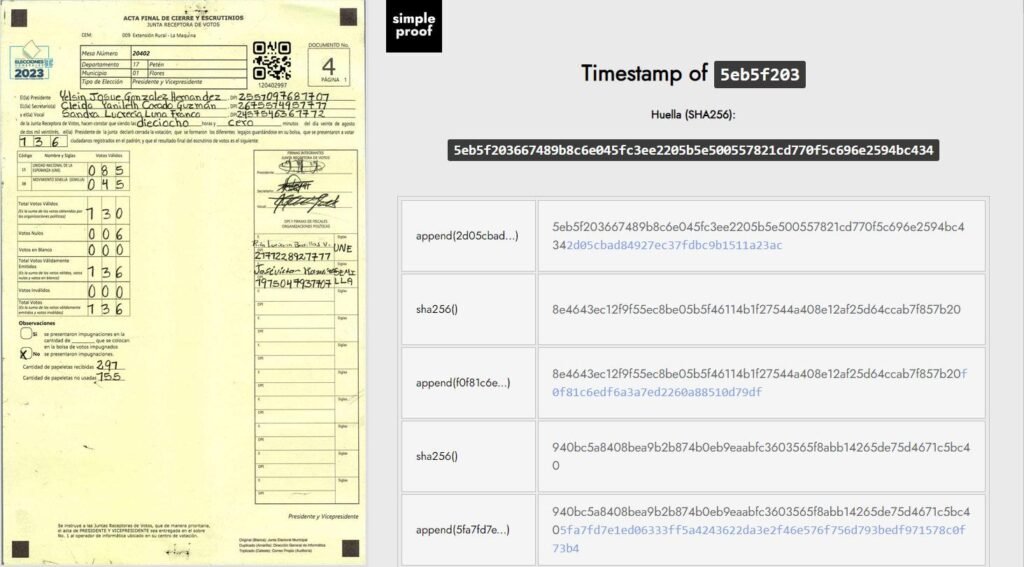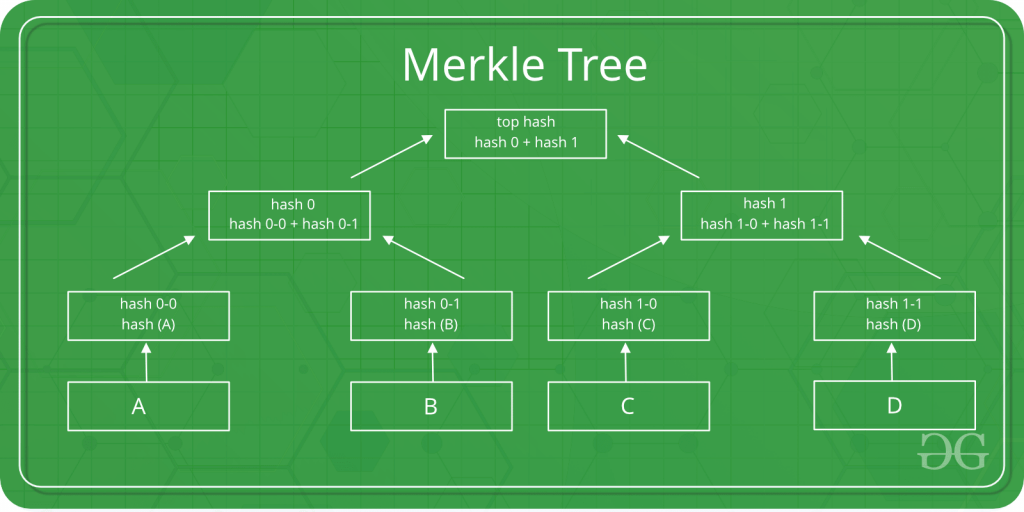Guatemala’s Supreme Election Tribunal has embraced the potential of Bitcoin’s blockchain, deploying the OpenTimestamps tool to timestamp critical election documents.
The country’s commitment to electoral integrity is evident through its innovative use of blockchain technology in the electoral process.
This forward-thinking approach not only showcases Guatemala’s dedication to maintaining the credibility of its electoral system but also signifies its willingness to adopt cutting-edge solutions to address contemporary challenges.
Related reading : Blockchain-Based Voting May Be Necessary for Elections During the Coronavirus Pandemic
Related reading : Blockchain-Based Voting: Present, Future of Elections
By leveraging the Bitcoin blockchain, the nation has added a robust layer of security that enables citizens to verify the timestamps of these vital documents, enhancing transparency and trust in the electoral process.
In a world where concerns about electoral integrity have become increasingly prevalent, Guatemala’s initiative is a shining example of how technology can be harnessed to safeguard the foundations of democracy.
By utilizing blockchain technology, the country has taken a significant step towards preventing fraudulent activities, while paving the way for other nations to explore similar innovative solutions.
In doing so, Guatemala sets a precedent for electoral transparency and accountability, fostering confidence among its citizens and inspiring the global community to explore novel approaches to securing the integrity of their own elections.
Guatemala’s Utilization of OpenTimestamps for Fraud Detection
Guatemala’s groundbreaking electoral integrity initiative relies on the innovative OpenTimestamps tool, developed by Bitcoin developer Peter Todd. Collaborating with the Guatemalan tech startup Simple Proof, this system has been deployed to guarantee the authenticity of election-related documents.

It achieves this by creating cryptographic timestamps for essential election data and embedding them within the Bitcoin blockchain, establishing an immutable and publicly verifiable record of the information’s existence.
At its core, OpenTimestamps utilizes hash functions, a mathematical process that converts variable-length input into a consistent output. The hash is very easy to compute, but getting from the hash digest to the original input is almost impossible.
By hashing election data and storing it in the Bitcoin blockchain, the system ensures a permanent and easily verifiable record of when the information was created. In the event of discrepancies or tampering allegations, the original data’s hash can be compared to the stored value in the blockchain, enabling the detection of any post-timestamping alterations.

To streamline the process and prevent overwhelming the blockchain with individual data entries, OpenTimestamps employs Merkle trees. This technique involves hashing multiple data pieces into a single root hash, allowing the efficient embedding of numerous records into the blockchain through a single transaction. This approach not only preserves the integrity of individual data elements but also spreads the cost of embedding that data across multiple records.

A Revolutionary Move Towards Transparency in Elections
In the midst of enduring challenges related to political corruption and fraudulent activities, Guatemala’s Supreme Elections Tribunal (TSE) has embraced an innovative solution. Collaborating with ITZ DATA to implement the “Immutable Backup” solution developed by Simple Proof, the TSE has taken proactive steps to protect its election documents.
Rafael Cordón, co-founder of Simple Proof, emphasizes that this partnership serves as a robust deterrent against document tampering, allowing any citizen to independently verify the information’s integrity.
This newfound transparency empowers Guatemalans to individually verify tally sheets, pivotal records that aggregate votes for each candidate at individual voting stations.
By granting public access to these documents and their timestamp data, people gain insight into the operational aspects of the election process. While this system doesn’t validate the content of individual tally sheets, it provides a transparent overview of the entire electoral journey.
Challenges Faced in Elections
The election of President-elect Bernardo Arévalo caused quite a stir, with his unexpected victory giving rise to a whirlwind of controversy. Allegations of fraud began to swirl, prompting official investigations into the actions of the Supreme Elections Tribunal (TSE).
Amid this turmoil, the opposing UNE party entered the debate by sharing what they claimed was compelling evidence, which included a screenshot from the Simple Proof web tool. However, it became apparent that this screenshot was founded on a misunderstanding of time zones, leading to the conclusion that their allegations were unfounded.
Fortunately, the transparency of the timestamp data, made readily accessible to the public, came to the rescue by allowing for independent verification. This served to debunk the misleading claims presented by the UNE party.
Conclusion
The integration of Bitcoin and OpenTimestamps into the process played a pivotal role in bringing clarity to a situation that could have potentially escalated into a far more significant political crisis.
Beyond its role as a decentralized currency, Bitcoin’s versatility shines through its robust and transparent infrastructure. In the case of Guatemala’s election, it has partnered seamlessly with OpenTimestamps to safeguard critical election data, underscoring its potential impact across various sectors.
This innovative combination of blockchain technology and electoral integrity in Guatemala could offer a compelling template for other nations seeking to fortify public trust in their democratic processes.










